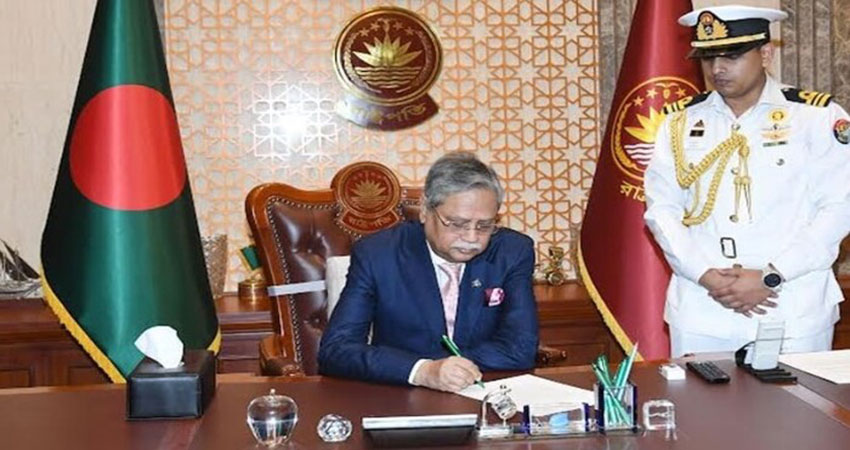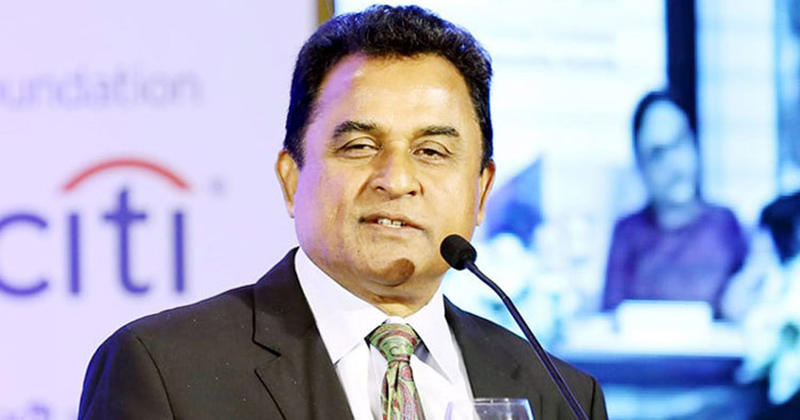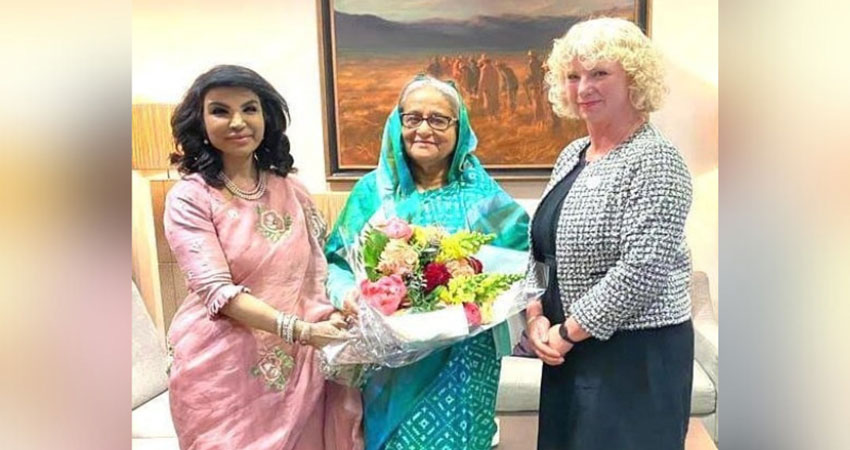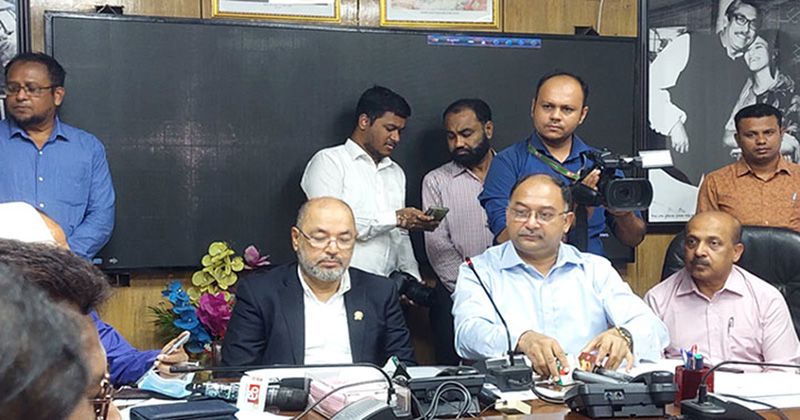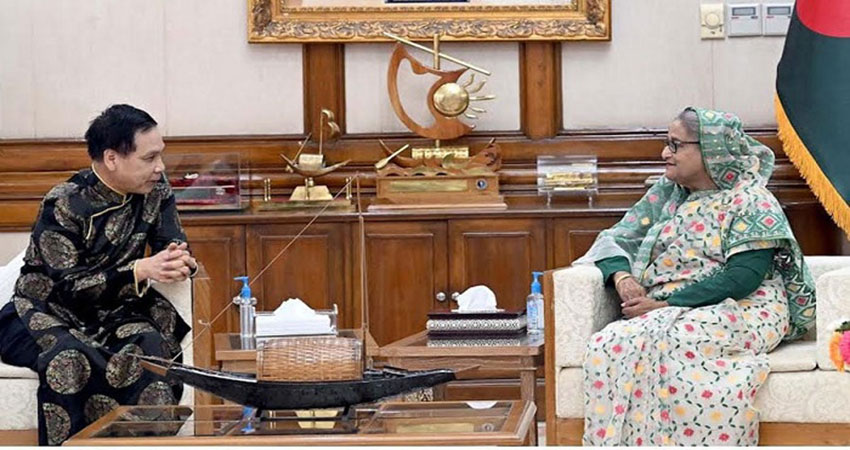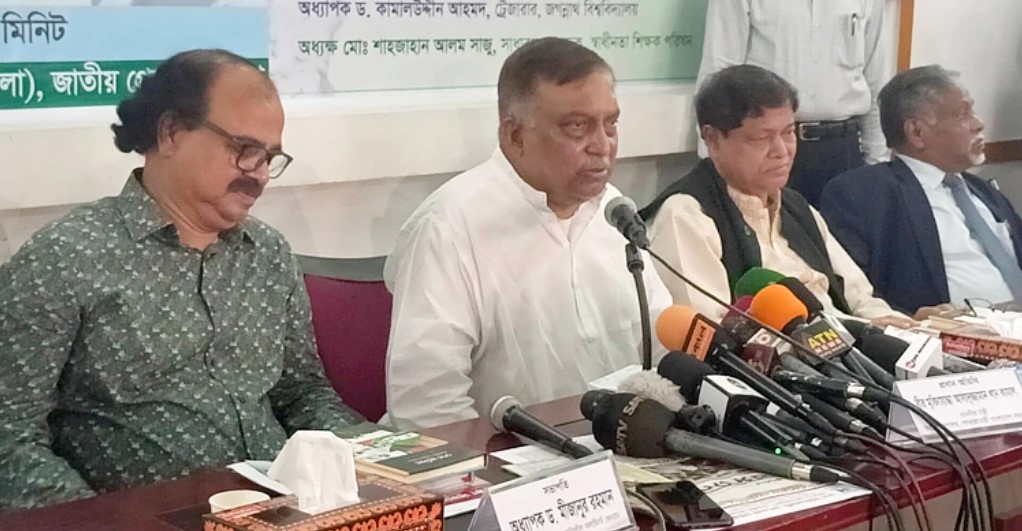Prime Minister Sheikh Hasina on Wednesday said she has a dream to turn Bangladesh into a trillion-dollar economy, urging the South African investors to come up with robust investment particularly in the ICT, infrastructure, textiles and tourism.
"I have a dream; the 170 million people of Bangladesh have a dream. And that is, to become a trillion-dollar economy and a fully developed smart nation by 2041," she said, reports BSS.
In pursuit of achieving the dream, the premier said they have embarked on an ambitious endeavor aimed at setting down long-term objectives for prosperity and advancement.
She said this while addressing a Road Show titled “The Rise of Bengal Tiger: Bangladesh Trade and Business Summit" at Radisson Hotel and Convention Centre joining virtually from her Palace of Residence, the Radission Blu Hotel Sandton here.
Bangladesh Securities and Exchange Commission (BSEC) and Bangladesh Investment Development Authority (BIDA) jointly organized the summit.
Sheikh Hasina reached Johannesburg, South Africa, yesterday to attend the 15th BRICS Summit at the invitation of South African President Cyril Ramaphosa.
At the summit, the prime minister said Bangladesh has been steadfastly fortifying its commercial landscape to evolve into an even more friendly destination for trade, business, and investment.
"Our conviction rests in the belief that our endeavors will not only yield benefits for us but will also prove profitable for all those who choose to invest in our growing economy," she said.
The premier said they have welcomed investors worldwide, particularly from South Africa, to explore the numerous investment prospects within Bangladesh as this is the perfect time to acquaint yourselves with what Bangladesh offers.
"This is the time to know Bangladesh better and to invest in its future. --- We offer opportunities across sectors like ICT, electronics, infrastructure, textiles, tourism, heavy industry, and small industries. Our government is committed to facilitating smooth business operations," she said.
Mentioning that Bangladesh is ready to welcome prospective South African investors, she said Bangladesh's authorities such as the Bangladesh Investment Development Authority, Bangladesh Economic Zone Authority, Bangladesh Export Processing Zone Authority, Bangladesh High Tech Park Authority, and Bangladesh Securities and Exchange Commission, will all support foreign investors for optimal returns.
"Bangladesh progresses toward prosperity. We want you to join our journey of development. Do invest in Bangladesh; we are confident that your investment will be primed for success, and we are fully prepared for a sustainable partnership," she said.
The premier mentioned that a significant Bangladeshi population in South Africa forms a strong base, saying, "Thanks to expatriates for contributing to our economy. We urge you to invest more in our growth."
About the justification of making investments in Bangladesh, she said, "Indeed, your investment in our nation is secure due to consistently high Returns on Investment (ROI). Moreover, our government ensures a business-friendly and stable atmosphere that guarantees your investment's success."
Apart from this, she said Bangladesh promises a secure and prosperous future for global investors and currently Bangladesh has the most open foreign direct investment policies in South Asia that includes a liberalized industrial policy, one-stop service, an allowance for 100% foreign ownership, an easy exit policy, a 15-year tax exemption, a VAT exemption for imported machinery, streamlined services, and more.
"In our growing economy, we are poised for substantial long-term financing. Amid the 4th Industrial Revolution, AI, and Venture Capital, Bangladesh is pursuing "Financial Connectivity" globally, prioritizing "Investment Banking" over traditional Consumer Banking," she continued.
About why Bangladesh adopted "Look Africa Policy", Sheikh Hasina said Africa with a population exceeding 1.5 billion, is currently experiencing rapid urbanization and economic growth which provides favorable opportunities for Bangladesh to expand its exports, particularly in sectors like textiles, ready-made garments (RMG), pharmaceuticals, and agricultural products.
She mentioned that in the past decade, Bangladesh has shifted its focus on untapped markets in Africa.
Both government officials and business leaders in Bangladesh recognize the potential of African economies and the benefits of stronger trade relationships, she said.
With a growing middle class, an increasing population, and rising consumer demands, Africa becomes an attractive market for Bangladeshi exports, she added.
Simultaneously, Bangladesh is actively exploring avenues to procure essential natural resources and raw materials from African nations, she said, adding that this category includes the requisite raw materials for Bangladesh's growing industries, spanning minerals, petroleum products, cotton, agricultural products, and more.
Over the last five decades, Bangladesh and South Africa have built a strong and friendly relationship based on mutual respect, shared values, cultural ties, and common beliefs, the premier said.
This bond has been strengthened by growing trade connections as both countries have similar paths of development, making collaboration and growth feasible, she said.
Despite significant potential, she said the bilateral trade between Bangladesh and South Africa was only USD 316.83 million last year, falling short of its full potential which presents a promising opportunity for collaboration, given the export and import potential of both nations.
"We are confident that ample collaboration opportunities exist for both the nations, involving business communities and trade organizations. Beyond existing bilateral mechanisms, we're enthusiastic about establishing a 'Joint Committee on Trade and Investment' and negotiating a 'Double Taxation Avoidance Agreement with South Africa'," she said.
The premier said a joint business forum between the Federation of Bangladesh Chambers of Commerce and Industry-FBCCI and the South African Chamber is also in Bangladesh's plans.
Bangladesh Foreign Minister Dr AK Abdul Momen and Prime Minister's Private Investment and Industries Affairs Adviser Salman Fazlur Rahman, among others, were present as Minister of Public Works and Infrastructure, South Africa, Sihle Zikalala spoke at the event.
BIDA Executive Chairman (Senior Secretary) Lokman Hossain Miah and BSEC Chairman (Senior Secretary) Professor Shibli Rubayat-Ul-Islam gave brief descriptions about Bangladesh's economy and the government's efforts to expedite foreign direct investment in Bangladesh.
This is the 7th Road Show being at the largest city of South Africa, Johannesburg aimed at attracting larger South African investments in Bangladesh.
As part of the move to attract global investment, the BIDA and BSEC organisd the identical road shows at Dubai, USA, Switzerland, the United Kingdom, Qatar and Japan.
Bangladesh is also planning to hold the similar road shows in Germany, Canada, Russia, Hongkong, Malaysia and other countries.
Sheikh Hasina said it is a matter of immense pride that, despite emerging from challenging circumstances, Bangladesh has now transformed into a country distinguished by remarkable strides in economic advancement and national progress.
"This is due to our five decades of steadfast determination, relentless effort, and the uncompromising commitment of our citizens. Recently, numerous global research studies and comprehensive analyses have shown that Bangladesh's journey of success serves as a distinctive developmental lesson for the global community," she said.
The prime minister said Bangladesh stands among the world's fastest-growing economies, demonstrating its capacity to overcome adversities like poverty and natural calamities while also easing the suffering of its people.
That is why Bangladesh is so often cited as an example of growth, development, and welfare in developmental literature and is also often seen as a land of people of indomitable spirit, she continued.
"Over the past decade, Bangladesh has consistently maintained an average growth rate ranging from 6% to 7%. This resilience has been evident even in the face of the pandemic and unprecedented economic challenges in recent times," she said.
In fact, the formal recognition in 2021 of Bangladesh's transition from a 'least developed country' to a 'developing' country underscores this remarkable trajectory, she said.
"Indeed, we have already set our sights on achieving the SDGs by 2030, reaffirming our commitment to forging a path of progress and prosperity," she said.
The prime minister said Bangladesh is establishing 100 Special Economic Zones, 109 Hi-Tech and Software Technology Parks, and IT Training and Incubation Centers across the country to facilitate commerce and industrialization.
The recent inauguration of the Padma Bridge and Matarbari Deep Sea port will further amplify both external connectivity and internal trade, thus acting as catalysts for growth, she said.
"Our strong and robust private sector will keep providing a great range of opportunities for those who invest in our economy in the future. We are confident that we are heading full speed forward on the path of the 4th industrial revolution," she said.
The premier also said the heart of our strength lies in the people of Bangladesh with about 55 million youths with the requisite skills committed to accomplishing the required tasks in future.
"Our fortunate position is enhanced by connections on both regional and global levels. Additionally, a growing domestic market and an expanding consumer class further strengthen this demographic benefit," she opined.
The premier went on saying that Bangladesh Securities and Exchange Commission (BSEC) is elevating its capital market for essential long-term financing.
In 2020, the country's stock markets outperformed regional peers, with USD 61 billion in market capitalization, or 16.8% of GDP, she said.
"For financial progress, we have expanded our bond market, introducing Sukuk, Green Bonds, ETFs, Venture Capital, Private Equity, and Impact Funds, diversifying investment opportunities. Soon, we are going to include derivative products in our capital markets, which will help minimize investment risks through hedging," she said.
Source: UNB












